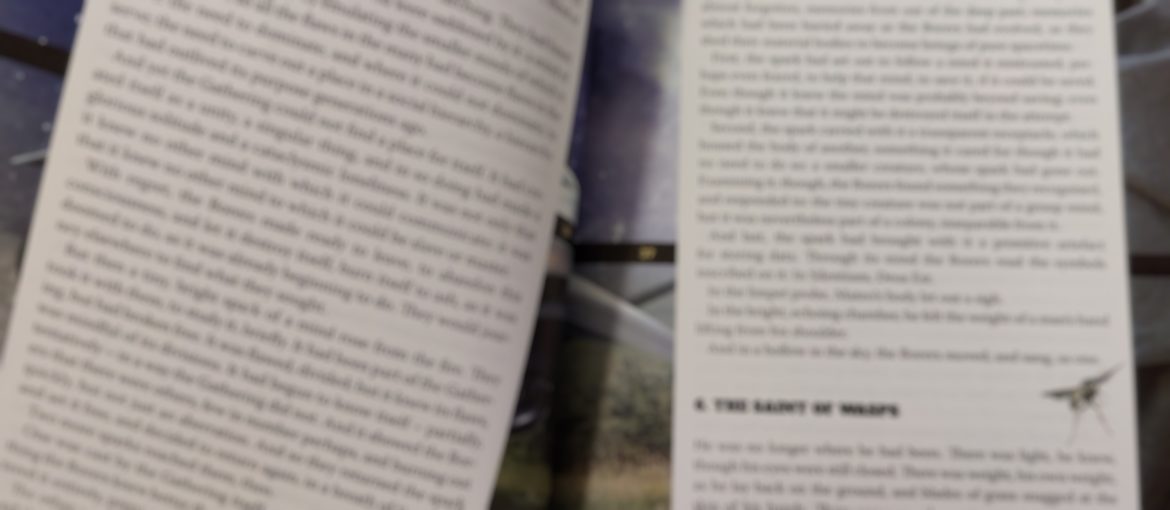Outer, Hollis Joel Henry. Memorably written, and a nice story with which to return to Clarkesworld. It has been a few years!
The author appears to be based out of Trinidad and Tobago and the speech patterns of characters are reflective of Caribbean English (at least in the opinion of someone who has never even visited the Caribbean), which I liked. The story itself concerns Toozen, a second generation child of “Septembers” – people who were afflicted with birth defects due to some kind of scientific experiment or contamination in the past. Many such second generation children ‘pass’ as normal until they grow out of childhood.
The story concerns the prejudices held about these September children, and how this grows into distrust, fear, hatred and ultimately church- and possibly state-endorsed vigilantism. Toozen is a warm, empathetic, trusting kid who wants to be liked and fit in, but no matter what he does it is never enough for those who see him as other. There are clear parallels that can be drawn from this, although most who could recount similar stories from their lives will lack adult Toozen’s unique and violent capabilities for self-defence and deterrence.
Eyes of the Crocodile, Malena Salazar Macia trans. Toshiya Kamei. A woman discovers a crocodile’s eye growing upon her breast, and knows it for a mark of the nanobot plague that afflicts humanity like a maliciously communicative cancer. Her husband died when those same nanobots went wild during a scarification ceremony, and she expects the same fate. She knows she can no longer remain with her tribe and instead requests a vehicle to journey to The Tree, which we soon learn is some kind of network hub, a point of origin for code/instruction propagation to the distributed nanobot cloud.
The world this story portrays is one of ruin, collapse and isolation, but it is not without meaning or hope. Good story.
Mandorla, Cooper Shrivastava. Told from the perspective of Old Plant, which I came to think of as something like the “Pando” clonal colony of aspen trees in the US, this story contrasts the perspective of a extremely long-lived and slowly-reproducing species with the Kelp, who live shorter lives. The history of the Kelp evolves and morphs and thrives, surviving multiple schisms and internal conflicts. One constant is that the Kelp consult with Old Plant, even if the Kelp speaker changes as generations pass.
I really enjoyed this story and thought it an interesting exploration both of the contrasted alien perspectives, and of their problem-solving capabilities when it comes to something outside their standard framework. A great read.
The Host, Neal Asher. Contains many staples of Asher’s SF: hard men, duplicitous artificial intelligence, advanced tech, devastating guns, power armour, and of course oogly alien monsters. Although some of these tropes are undercut here!
Protagonist Ivebek is a changed man, though he does not understand why or how and his memory betrays him. He remembers being a criminal, a murderer and a slaver, but now he finds himself so full of empathy that he cannot kill. People, that is. It doesn’t take long before he’s annihilating fauna.
The story’s end can be seen coming some distance off but the story anticipates this, choosing to shift into a debate of alien and human morality, with the reader’s growing awareness of what might elsewhere have been a twist instead feeding their perspective on said debate. Perhaps a little overlong considering the payload sits in the last thousand words or so, but I enjoyed this brief delve into Asher’s Polity setting after more than a decade away.
Jigsaw Children, Grace Chan. In near future China we follow the life of one of the eponymous “jigsaw children”: genetically tailored infants designed by experts at the behest of parents-to-be, then gestated and brought to term within “birthing mothers”. The jigsaw children are raised in an almost hermetically sealed environment, and whilst their lives are rarely cruel they are certainly not free. The children are precocious enough to discuss philosophical questions around their own intellectual and physiological superiority to the natural-born, and for one rebellious child to mock their group taboos around natural birth.
Time passes: the children grow up. The woman we follow cannot but return to the fact of her creation and upbringing, the root of her identity a gravity well she cannot escape. There’s beauty and ugliness aplenty in this wonderful, thoughtful story.
Generation Gap, Thoraiya Dyer. A quite different kind of story to ‘Jigsaw Children’ but one which is also concerned with children, with generational reproduction, with questions of tradition and morality. Violence is more prominent here.
The Hapkui family live within Greenhill, growing crops and raising dogs to feed themselves and trade with the nearby city. Their enemies and rivals are the Kɜkaveə, oyster farmers who are smaller in stature. Each family plots and raids against the other until a change in regional leadership forbids this.
Meanwhile, the ‘Child’ of each family – roles within each tribe or family are linearly assigned across generations, with each person graduating to a different social role as the Child ages into their first true role – meets their counterpart in secret, and a friendship buds. Whether this friendship can survive the future planned out for them is another matter. A compelling and tragic story.

